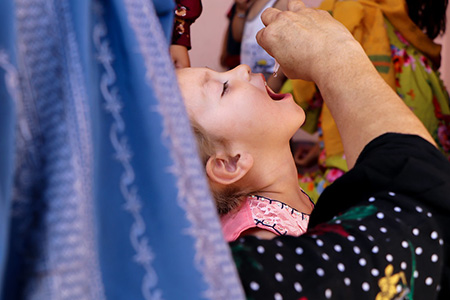 Cairo, 14 June 2022 – The fifth meeting of the Regional Subcommittee on Polio Eradication and Outbreaks was convened on 14 June by WHO’s Regional Director for the Eastern Mediterranean, Dr Ahmed Al-Mandhari.
Cairo, 14 June 2022 – The fifth meeting of the Regional Subcommittee on Polio Eradication and Outbreaks was convened on 14 June by WHO’s Regional Director for the Eastern Mediterranean, Dr Ahmed Al-Mandhari.
The meeting comes at a time when Afghanistan and Pakistan, as the last two endemic countries in the world, continue their efforts to stop wild poliovirus transmission, – and several countries in the Region are responding to circulation of vaccine-derived polioviruses.
“The continued presence of any circulating poliovirus in any country of the Region has catastrophic consequences for children who are paralyzed, and poses a threat to national, regional and global health security. The need for regional solidarity, collaboration and collective action has never been greater,” said Dr Al-Mandhari.
Polio remains a Public Emergency of International Concern with wild poliovirus (WPV1) continuing to circulate in Pakistan and Afghanistan. In 2022, one case of WPV1 has been reported in Afghanistan and eight cases in Pakistan, all from the North Waziristan district in southern Khyber Pukhtunkhwa province.
Transmission of circulating vaccine-derived poliovirus type 2 (cVDPV2) continues in the Region in 2022. As of June, Djibouti, Egypt, Somalia and Yemen are responding to ongoing cVDPV2 transmission.
During the fifth Subcommittee meeting, Member States issued two statements; the first on the persistence of wild poliovirus in the epidemiological bloc of Afghanistan and Pakistan, and the second on stopping the expanding cVDPV2 outbreak in Yemen, and on the need for Somalia to fully implement the new Somalia Emergency Action Plan, launched at the Somalia Call to Action Meeting for Polio Outbreak Response in March 2022, to stop the longest running cVDPV2 outbreak.
“Pakistan’s Polio Programme continues to work extremely hard to reach zero polio, and the recent cases in Pakistan have made us more determined to fight this virus till the very end. Since the first case appeared, the health ministry and the polio programme have been working very closely together to meet the needs of the hour and effectively interrupt poliovirus transmission,” said H.E. Qadir Patel, Minister of Health, Pakistan.
Emphasizing the importance of reaching all children, co-chair of the Regional Subcommittee, Dr Hanan Al-Kuwari, Minister of Public Health of Qatar, said, “For our Region to be free of polio, we have to get ahead of the virus and strengthen immunity levels in all at-risk children across the Region, particularly those who are inaccessible or persistently missed by routine immunization and polio vaccination campaigns.”
Reflecting on the urgency of stopping poliovirus circulation in the Region, Subcommittee co-Chair and Minister of Health and Prevention of the United Arab Emirates, H.E. Abdul Rahman Mohammed Al Owais, welcomed the decision by Dr Al-Mandhari to place all WHO operations for polio eradication on an emergency footing, using the standard operating procedures for graded emergencies.
“For us to succeed, we need WHO and relevant stakeholders to systematically apply standard operating procedures for graded emergencies to finally stop all polio in the Region,” H.E. Al Owais said.
During the meeting, Dr Al-Mandhari recognized Djibouti and Sudan for their timely and sustained efforts in responding to the detection of circulating vaccine-derived polio virus.
“The support of the Subcommittee is critical for our work to bring an end to polio. I am thankful to Members of the Subcommittee and the leadership of GPEI partners for their continued commitment and solidarity to finally end polio in our Region.” said Dr Hamid Jafari, director of the regional polio programme and co-facilitator of the Regional Subcommittee.
The meeting was attended by health ministers or their representatives from Djibouti, Egypt, Iraq, Pakistan, Qatar, Sudan, Tunisia and United Arab Emirates, along with representatives from the partners of the Global Polio Eradication Initiative and donors.
More information about the Regional Subcommittee and previous meetings can be found here: Regional Subcommittee for Polio Eradication and Outbreaks website
For more information please contact:
Inas Hamam
Communication Officer
WHO Regional Polio Programme
This e-mail address is being protected from spambots. You need JavaScript enabled to view it
Notes for editors
The Regional Subcommittee was formally endorsed by Member States through a resolution at the 67th session of the Regional Committee for the Eastern Mediterranean in October 2020. The first meeting was held in March 2021.
The Subcommittee focuses on four strategic areas of focus to engage in coordinated action and support of regional polio eradication efforts including pushing for collective public health action, strengthening efforts to transition polio assets and infrastructure, advocating for the mobilization of national and international funding to sustain polio eradication efforts.




